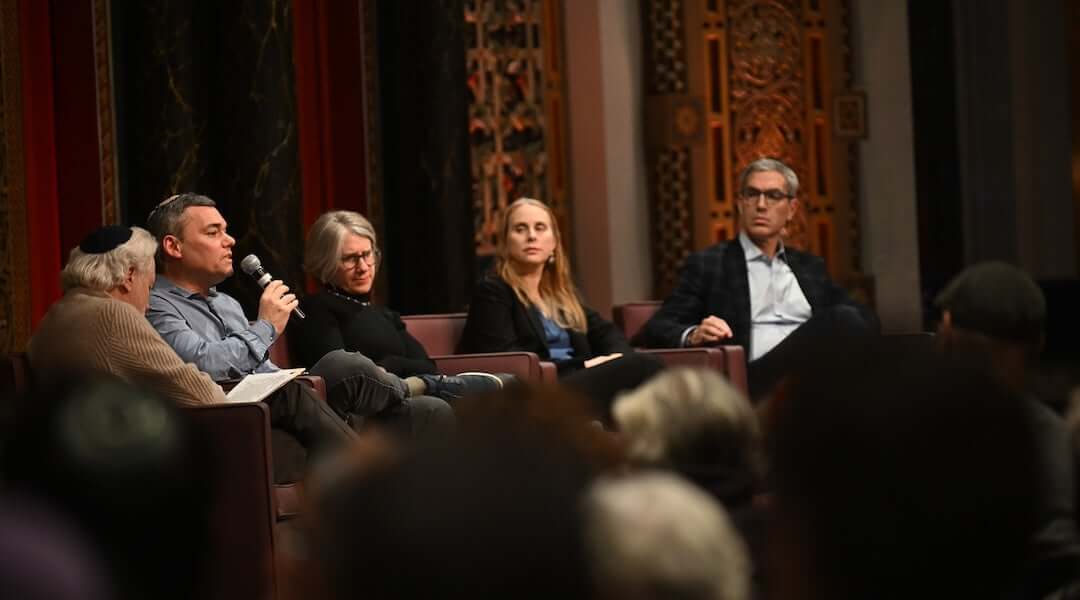Stymied by Israeli Bureaucracy, Ukrainian Has Been Making Aliyah for Years

Graphic by Angelie Zaslavsky
(JTA) — Sitting in his sister’s living room in this town outside Tel Aviv, Yuriy Yukhatskov says he’s glad to be far from his home city of Kiev.
Yukhatskov, 44, says that what he sees as the pervasive anti-Semitism in Ukraine’s capital would grow only worse with the country’s recent unrest. He fears that last month’s revolution could lead to a government unfriendly to Jews.
Israel feels foreign to Yukhatskov, but he’s grateful to be able to walk to synagogue wearing his kippah without enduring taunts or dirty looks.
His only problem is that in two weeks, Israel might kick him out for being a Christian.
Yukhatskov and his mother applied in 2011 to immigrate to Israel and join his sister, who moved here in 2008.
His mother was approved to immigrate, but things did not go as smoothly for Yukhatskov.
One of his answers on Israel’s extensive application for aliyah put Yukhatskov in Israeli bureaucratic limbo, where he’s been for nearly three years.
The form asked for his nationality, home country and religion. Under nationality he wrote “Jewish.” Under home country he wrote “Ukraine.” And under religion he wrote “Christian.”
Israel’s Law of Return allows anyone with at least one Jewish grandparent to immigrate to the country. The only exceptions are Jews who have embraced another religion; Yukhatskov would be ineligible for aliyah if he were Christian. So based on his answer, Israel denied his aliyah application.
Of course he’s Jewish, Yukhatskov says, wearing a white-knit kippah and retelling his story as if he’s gone through it countless times. He says he misunderstood the form and thought the “religion” line referred to Ukraine’s religion, not his own.
“I didn’t write that I was Christian,” he said, his sister translating his Russian to Hebrew. “I didn’t understand what they were asking me. I wrote automatically that I was Jewish, but that the religion of the country is Christianity.”
The Israeli Population and Migration Authority has refused to accept Yukhatskov’s explanations, though it is allowing him to repeat the application process.
Sabin Haddad, the authority’s spokeswoman, wrote to JTA that Yukhatskov “indicated on his aliyah form that he’s a Christian” and that “the claim that this is a mistake is completely irrelevant.”
At least 400 would-be immigrants from the former Soviet Union have made the same mistake as Yukhatskov, according to Rabbi Seth Farber, the founder of Itim, an Israeli organization that guides people with religious status issues through the Israeli bureaucracy.
Itim has aided Yukhatskov, a professional photographer, in his reapplication process. If he is denied again, the organization said it may petition the Supreme Court to review his case and change the aliyah form.
“We realized there was a bigger issue here that would affect a lot more people,” Farber said. “There has to be a much deeper understanding between those who are in charge of aliyah and the local Jewish communities as to who is aliyah eligible.”
During the past three years, Yukhatskov has gone through a process he called “not even Soviet bureaucracy but even worse.” Upon denying his application, Israeli consular officials in Kiev told him he could come to Israel as a tourist and try to resolve the matter here.
Yukhatskov has since come to Israel three times, starting the application from scratch and submitting it in Tel Aviv, this time writing “Jewish” as his religion. He attached a letter from one of Ukraine’s chief rabbis, Moshe Azman, attesting to his Jewishness, Jewish practice and regular attendance in synagogue. Israeli Absorption Minister Sofa Landver also has sent a supporting letter to the Interior Ministry.
After his most recent flight to Israel, in February, a passport control official questioned Yukhatskov in a private room and kept him waiting for four hours.
“She asked, ‘Why are you wearing a kippah? You’re Christian,’ ” he recalled. “She turned on her computer and said, ‘You can’t enter Israel.’ I was in shock.”
Yukhatskov was admitted with a one-month tourist visa, two months shorter than the standard. He has since been allowed to stay until April 6, when he will have another interview regarding his application. He will be sent back to Kiev unless he is approved.
Given the Interior Ministry’s previous refusals, Farber said, chances of approval this time are slim.
“Here’s a guy dealing with Kafkaesque bureaucracy,” Farber said. “We want to fight. We’re very interested in resolving the larger issue.”
Unable to work or take advantage of free Hebrew classes offered to immigrants, Yukhatskov says he spends his days helping his mother and trying to glean what Hebrew he can from Israeli TV. While the process has exasperated him, he says he’d still rather be in Israel than back in Kiev.
“I don’t want to be disillusioned,” he said. “I really want the story to end well finally, so I have a chance to live here and be with the family. There’s no other way.”













